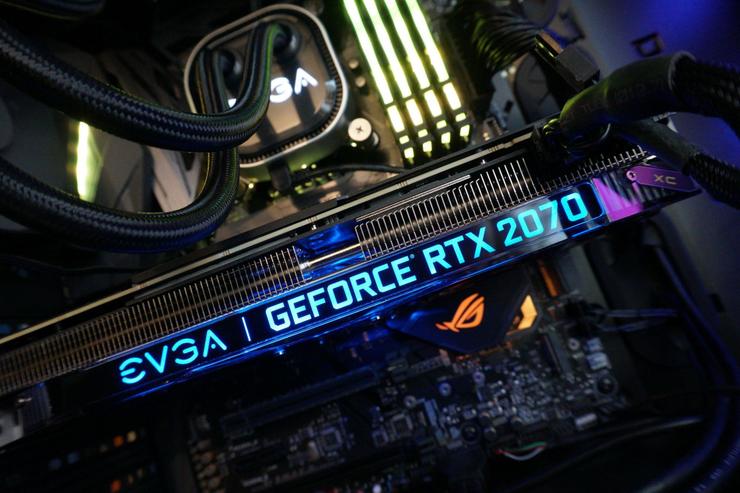 Credit: Brad Chacos/IDG
Credit: Brad Chacos/IDG
EVGA GeForce RTX 2070 XC overclocking
We haven’t traditionally included overclocking performance in our reviews, but the new one-click Nvidia Scanner auto-overclocking tool, baked into third-party software like EVGA’s slick Precision X1, makes overclocking RTX 20-series cards a breeze. Just click the scan button, wait 20 or so minutes for the software to determine the perfect voltage curve for your particular GPU, then click Apply when it’s done. Bam! You’ve overclocked your graphics card—no muss, no fuss. For better results, drag the voltage, power limit, and temperature sliders all the way to the right, which lets the card consume more power and run hotter in the quest for more frames.
You’re still beholden to the silicon lottery, though. Our EVGA RTX 2070 XC got a +128 score from Nvidia Scanner. After applying the customized overclocking and voltage curve, GPU-Z registered our base/boost clock speeds at 1,497MHz and 1,797MHz, respectively. That’s just behind our Nvidia RTX 2070 Founders Edition reference sample, which hit +160, but EVGA’s higher power limit flexibility helped it close the gap. EVGA lets you increase the RTX 2070 XC’s power limit by 30 percent, the highest amount we’ve seen with any RTX 20-series graphics cards. The Nvidia RTX 2070 Founders Edition only lets you increase power by 16 percent.
 Brad Chacos/IDG
Brad Chacos/IDGWith the automatic overclock and increased power and voltage limits applied, both the EVGA RTX 2070 XC and Nvidia’s Founders Edition hovered between 1,995MHz and 2,010MHz in games, depending on the load, and delivered virtually identical overclocked results. The overclocking resulted in a 4-percent to 5-percent performance increase in several games, though some titles stayed pat.
Manual overclocking and memory overclocking could no doubt boost results even more, but the Scanner-supplied overclocked delivers more performance with minimal effort. There’s every reason to exercise this feature if you buy an RTX 20-series card.
Should you buy the EVGA RTX 2070 XC?
Absolutely, if you’re in the market for a $500 graphics card that delivers stellar 1440p gaming, solid entry-level 4K gaming with the help of a G-Sync monitor, or ultra-fast 1080p gaming a high refresh rate monitor.
 Brad Chacos/IDG
Brad Chacos/IDGOur GeForce RTX 2070 Founders Edition review established that Nvidia’s new GPU is the best graphics card you can buy in this price range. GTX 1080 prices start around $480 on Newegg, and most Radeon Vega 64 options are selling for north of $580. Pass. While the RTX 2080 is no faster than the GTX 1080 Ti despite its higher prices, it’s essentially asking you to pay a premium to gamble on the promise of ray tracing and DLSS alone.. The RTX 2070 gives you access to that untapped potential and a solid across-the-board performance boost. The new RTX-series GPUs also take a much smaller performance hit on HDR displays. It’s well worth paying slightly more than you would for a GTX 1080 to get all those extras.
And with EVGA’s superb GeForce RTX 2070 XC, I do mean “slightly.” At $550, you’re not paying much more than you would for a GTX 1080, but you’re paying far less than the Nvidia Founders Edition’s $600 asking price. EVGA delivers more features for the lower price, too—customizable RGB LEDs and shroud trim, a far superior cooling solution, and a higher power limit option for overclocking than we’ve seen with any rival RTX GPUs. Quick, effortless software tweaking can get this card running at 2GHz in no time.
 Brad Chacos/IDG
Brad Chacos/IDG
The EVGA GeForce RTX 2070 XC
Add it all up, and the EVGA RTX 2070 XC is a winner. The only potential reason for pause: All RTX 2070 GPUs pack half the futuristic RT and tensor cores of the GeForce RTX 2080 Ti. Nvidia’s released some canned ray tracing and DLSS demos to reviewers, but without being able to test the technologies in actual games, we don’t know how much (if any) of a performance impact the reduced core counts will bring in next-gen RTX workloads. If you’re gung-ho about ray tracing and DLSS, consider waiting for games to support the technologies in real life before deciding whether to invest in an RTX 2070 or one of its more potent siblings.
Putting that aside, the EVGA RTX 2070 XC nevertheless gets you a spot at the ray tracing table, delivers better performance than the GTX 1080 in traditional games, packs a potent cooler with nifty customization extras, and does it all for $50 less than Nvidia’s comparable Founders Edition. Highly recommended—though at $380 or so, the older GTX 1070 remains an intriguing and much cheaper option for gamers with a 60Hz, 1440p display.

















